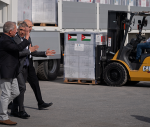You are here
Africa’s philanthropic potential
Jan 07,2019 - Last updated at Jan 07,2019
LOMÉ — It has now been more than three years since the United Nations General Assembly adopted the 2030 Agenda for Sustainable Development, and the money required to meet the Sustainable Development Goals (SDGs), the agenda’s key targets, remains elusive. In fact, less than half of the $6 trillion in annual financing that is needed has even been pledged.
But while the dearth of global funding could be viewed as a tragedy for the Global South, for Africa, it actually represents a tremendous opportunity.
Foreign aid has long supported Africa’s progress. But Africans are increasingly able to invest in their own solutions. By 2025, African household and business spending could hit $5.6 trillion, and Deloitte estimates that by 2030, a half-billion Africans will have disposable income. If every African with the means contributed $1 a month for a year to pool our own resources, the benefits would be profound.
But before we can even begin to dream of legions of homegrown donors, the immediate goal must be to create networks and strategies to maximise the benefits of African giving. The first step is to build philanthropic infrastructure, the technological, legal, tax and accountability systems needed to ensure that donations are secure. While digital financial services have already made fundraising easier, the scale of online giving in Africa remains small. For example, Africa’s largest online fundraising platform, M-Changa, launched in 2012, has collected money from more than 340,000 donors for some 29,000 projects. China’s Tencent charity platform, by comparison, solicited 28 million donations in just three days last year.
Moreover, Africa’s civil-society organisations (CSOs) must become more adept at persuading potential African donors that they are worthy aid recipients. According to EPIC-Africa, a Dakar-based non-profit that tracks CSO effectiveness, there is little credible data on the number of African CSOs, what they do and how they effect change in the places where they operate. In other words, donors have little way of knowing whether their money is being well spent. If African philanthropy is ever to serve as an effective catalyst of human progress, greater CSO transparency will be needed.
Aware of these shortcomings, EPIC-Africa has formed a partnership with the Rockefeller Foundation to create the African CSO Excellence Awards, a programme designed to recognise organisational capacity on issues like strategic ability, leadership, governance, financial health and project monitoring. The ultimate goal is to strengthen philanthropic infrastructure to make charities more effective and more accountable.
Finally, Africa’s philanthropic push should target economic growth. One of the best ways to shift Africans’ focus from poverty reduction to wealth creation is by supporting small and medium-size enterprises, including female-run farms. That way, when governments build systems that connect intra-African trade to global value chains, well-resourced SMEs can maneuver to take advantage. And when SMEs succeed, jobs are created, helping more people find means of upward mobility.
The African diaspora, as well as Africans on the continent with disposable income, can help governments achieve the SDGs by directing resources to organisations that are best positioned to create African wealth. By strategically pooling their financial resources, Africans could end poverty, eradicate diseases, improve healthcare systems and educate the continent’s children. All of this would help Africa realise its economic potential, including its potential to fuel global prosperity.
Since 2015, Africa’s household spending growth has averaged 3.5 per cent, and by the end of 2019, consumer demand is forecast to add as much as $1.1 trillion to African GDP, further evidence that a growing number of Africans have the financial means to help the African continent achieve its human-development objectives. What is needed now are the tools to adequately channel Africans’ new philanthropic capacity.
The international community should continue to support progress across Africa, and better resourced countries should fulfil their unmet SDG funding commitments. But Africans do not need to wait for the world to come to the rescue; we have the resources we need right here at home. After so many decades of dependence on foreign funding, it is time that wealth, and not poverty, dictates how the African continent develops.
Carl Manlan, a 2016 New Voices fellow at the Aspen Institute, is chief operating officer at the Ecobank Foundation. Copyright: Project Syndicate, 2019. www.project-syndicate.org












